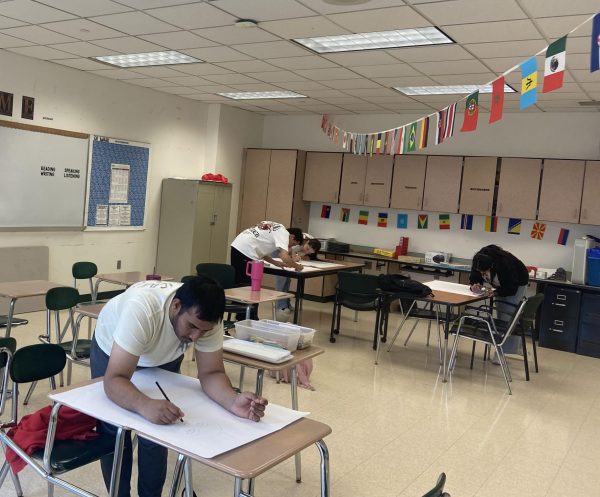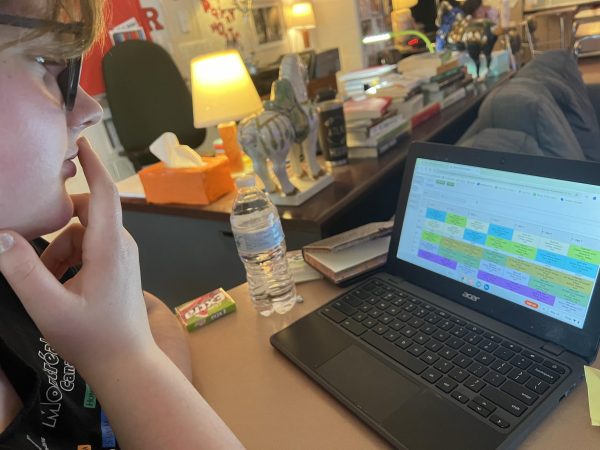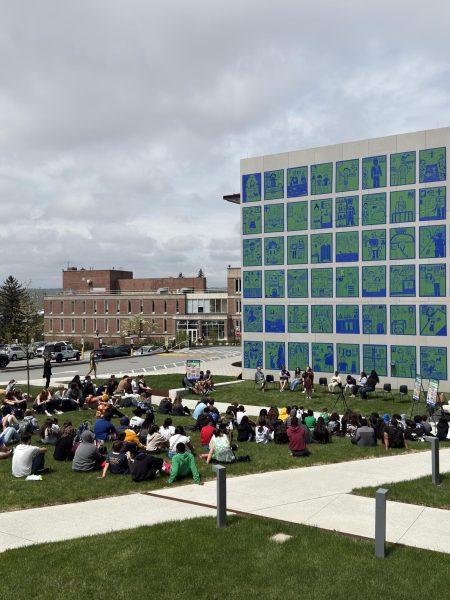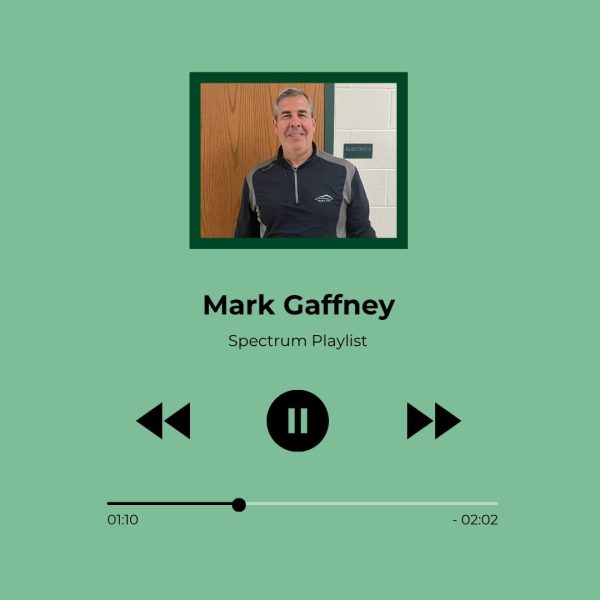ALICE drills: Better safe than sorry
ON FRIDAY, MAY 4, Block Two was interrupted by a chilling announcement: an ALICE drill was soon to commence. Students would soon hear a whistle that represented gunshots and make the split second decision to either barricade or bolt.
ALICE, a method of training that guides civilians in responding to active shooters, was taught to students at assemblies, but had yet not been practiced in simulation form. The acronym stands for alert, lockdown, inform, counter, and evacuate, the crucial principles of the program. Faculty members previously participated in their own separate drill to be better prepared to help students.
In the student training, a staff member simulated the sounds of an active shooting by blowing a whistle. Students were also informed of the intruder’s movements from Room B7 to the main foyer through announcements made by Principal Ross Thibault on the all-call system. Individuals were allowed to make their own decision to barricade in classrooms using desks, carabiners, and other available materials, or evacuate to rally points.
Sophomore Lucas Letourneau found the experience very helpful. “It was great that teachers and students got to experience the closest thing to a real life intruder situation,” he said. “In my class, I felt as though everyone took it very seriously by putting tables and desks up against the door and grabbing textbooks as a self defense mechanism. I also really liked how you were on your own to make a decision about running or barricading.”
The drill was executed well in Chemistry Teacher Douglas Smith’s classroom. “For our particular class, I was impressed by how the students took care of the situation,” he said. “The class next door also had a substitute, and they still handled it well. It was a complex scenario where we felt like we would barricade here and then evacuate.”
Junior Jaqueline Ferreira felt calm at first, knowing it was just a simulation. “It wasn’t until I heard the whistle blowing that it started to feel more serious knowing that we all had to treat it like the real thing,” she said. “But thanks to the drill, I feel a bit better prepared on how to handle the situation if one should occur.”
According to Mr. Thibault, such drills will become a more frequent occurrence. “Moving forward, it’s going to be routine business,” he said. “We’ll have a couple each year. We want to make sure our students feel safe and prepared.” He was impressed with how students responded and how quickly the building was emptied.
Mr. Thibault also said the drill was a learning experience. In regards to improvements that could be made he said, “There are some finer details we can iron out and we will. Administration and the police department will be having another training this May and will be working on improvements with the communication between two buildings.”
Students had suggestions for refinement as well. Many reported struggling to hear the whistle, while some believed the announcements of the shooter’s whereabouts to be too infrequent. Some were unhappy that the drill fell on Senior Skip Day, as well as a day many students were on field trips. According to Mr. Thibault, the date was selected as it was most convenient for both the school and police departments.
Others had ideas on how to improve the structure. While junior Abby Keith found the drill to be a beneficial practice, she also said, “I think it would’ve been better to have everyone practice barricading first and then do the situational drill. Also, the intruder should have moved around more as opposed to staying in one hallway, because that isn’t realistic.”
Many were also displeased with the fact that the shooter moved to the main foyer, believing it would be more realistic for the intruder to travel to an area with a higher concentration of students.
Junior Andrew Zhu appreciated the importance of participating in such a drill, but found fault with the overall effectiveness. “I think we were all simply rushed out in a fire drill manner. I think what was more helpful was the fact that many of my teachers went out of their way to discuss the possible situations and how to deal with it on a class by class basis,” he said. “Mr. Smith, Ms. Bottcher, and Mr. Tweedie all described certain situations and some of them even brought ladders, which I think encouraged all the kids to think about and be prepared for the drill and an actual event.”
Many described themselves as feeling safe in school and saw the drill as only adding to that feeling of comfort. There are still some concerns about safety measures outside the realm of the ALICE drill, though. Sophomore Sabrina Piers said, “It is concerning that in the morning anyone could get into the school and it would be incredibly hard, if not impossible, to tell if the person walking in was a current student or not dangerous.”
Mr. Thibault encouraged any students with ideas to improve security to approach an assistant principal. He also emphasized the idea of reporting questionable behavior as being crucial to safety.
“We rely on our students. If they see something out of the ordinary, they should say something,” he said. “And there have been instances where our students have done that. By sharing information, we keep everyone safe.”











Nicole Sheahan • May 30, 2018 at 11:12 pm
I was absent the day of the drill, but I was glad to hear it went well. Ms. Bancroft’s reporting filled in some details for me, especially students’ various reactions.
Just knowing the drill was coming likely pushed more teachers to have necessary, difficult conversations. In my own classroom, even though we had gone over basic plans, the impending drill led to another review and a very basic practice of how we would barricade.
The students’ suggestions reported by Ms. Bancroft seem to capture a balanced representation of reactions. Students suggestions all make sense and will be useful moving forward, but we should remember two ideas: (1) this drill was one more step, not the only or final step, in what will be an ongoing process as Mr. Thibeault noted; (2) hindsight is 20/20 and calling shots from the bleachers is always simpler than actually being the one calling them from within the chaos of the field. Administration and safety committee members, which includes Dartmouth PD officers, had to navigate innumerable factors to run this drill in a way that provided experience with the basic steps and to help all of us to think more before the next drill. It sounds as if the goal of experiencing a simulation was achieved and that improvements will be made for next time.